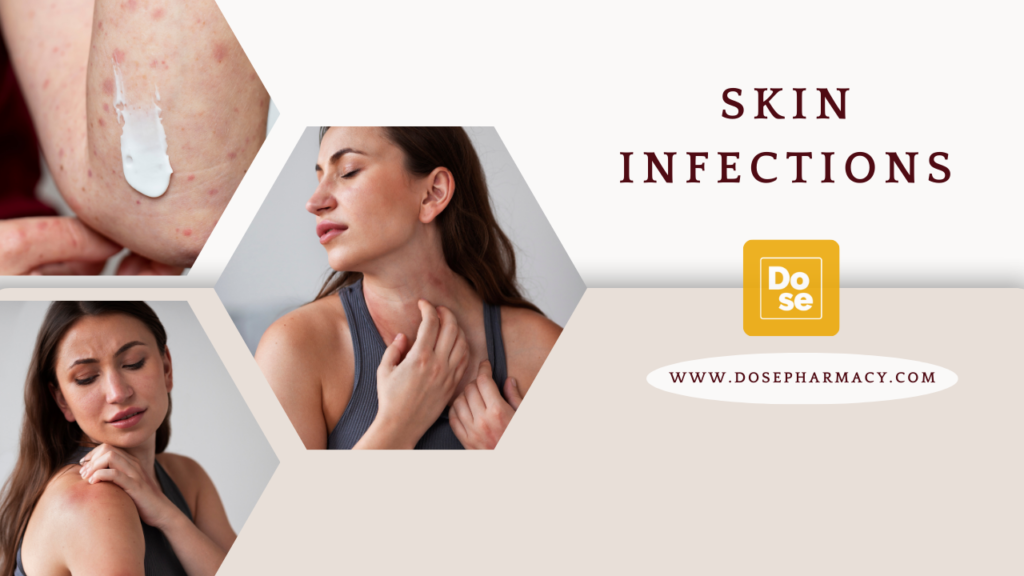Skin infections are one of the most common health concerns affecting people of all ages. They can range from mild irritations to serious conditions that require medical attention. Understanding the causes, symptoms, and treatment options for skin infections can help you manage them effectively and prevent complications.
What Are Skin Infections?
A skin infection occurs when harmful microorganisms — bacteria, viruses, fungi, or parasites — invade the skin, causing irritation, inflammation, or damage. Since the skin is the body’s first line of defense, any breach (like cuts, insect bites, or scratches) can allow pathogens to enter. Skin infection care starts with the right treatment.
Types of Skin Infections
Skin infections are classified based on the organism causing the infection:
1. Bacterial Skin Infections
Bacterial infections are usually caused by Staphylococcus or Streptococcus bacteria.
Examples:
- Cellulitis: Red, swollen, and painful skin that spreads quickly.
- Impetigo: A contagious infection causing honey-colored crusted sores.
- Boils: Painful, pus-filled bumps under the skin.
Treatment: Antibiotics (oral or topical), warm compresses, and proper wound care.
2. Viral Skin Infections
Viruses can infect the skin and sometimes spread to other parts of the body.
Examples:
- Warts: Caused by human papillomavirus (HPV).
- Cold Sores: Blisters around the lips caused by herpes simplex virus.
- Chickenpox/Shingles: Caused by varicella-zoster virus.
Treatment: Antiviral creams, oral medications, and supportive care to reduce discomfort.
3. Fungal Skin Infections
Fungi thrive in warm, moist environments like folds of skin.
Examples:
- Athlete’s Foot: Itchy, peeling skin between the toes.
- Ringworm: Circular, red rash with clear center.
- Yeast Infections: Common in skin folds.
Treatment: Antifungal creams, powders, or oral antifungal medications.
4. Parasitic Skin Infections
Parasites can live on or under the skin, causing severe itching and irritation.
Examples:
- Scabies: Mite infestation that causes intense itching, especially at night.
- Lice: Tiny insects that infest the scalp or body.
Treatment: Prescription creams or oral medications to kill the parasites.
Common Symptoms of Skin Infections
- Redness and swelling
- Pain or tenderness
- Warmth in the affected area
- Pus or fluid drainage
- Itching or burning
- Fever (in severe cases)
Risk Factors
Certain conditions increase the risk of developing skin infections:
- Weak immune system
- Poor hygiene
- Diabetes
- Chronic skin conditions (eczema, psoriasis)
- Cuts, wounds, or insect bites
- Close contact with infected individuals
Prevention Tips
- Practice good hygiene: Wash hands regularly.
- Keep skin clean and dry.
- Avoid sharing personal items like towels or razors.
- Treat wounds promptly and keep them covered.
- Wear breathable fabrics to prevent fungal growth.
- Maintain a strong immune system with a healthy diet and lifestyle.
When to See a Doctor
Seek medical attention if you experience:
- Rapidly spreading redness or swelling
- Severe pain
- Fever or chills
- Pus drainage that doesn’t improve
- Recurrent or chronic skin infections
Prompt treatment can prevent complications such as cellulitis spreading to deeper tissues or bloodstream infections.
FAQs
1. Are skin infections contagious?
Some skin infections (like impetigo, scabies, and fungal infections) are highly contagious, while others (like cellulitis) are not. Proper hygiene and avoiding direct contact can reduce transmission.
2. Can I treat skin infections at home?
Mild fungal or bacterial infections can often be managed with over-the-counter creams. However, severe, painful, or spreading infections require medical care.
3. What foods help fight skin infections?
A diet rich in vitamin C, zinc, and protein helps strengthen your immune system and speed up healing. Hydration is also key for healthy skin.
4. Can stress cause skin infections?
Stress itself doesn’t directly cause infections, but it weakens the immune system, making you more prone to bacterial, viral, or fungal issues.
5. Are antibiotics always necessary for skin infections?
No. Antibiotics are only needed for bacterial infections. Viral infections may need antivirals, and fungal infections require antifungal treatments. Misusing antibiotics can cause resistance.
Bottom Line
Skin infections are common but can usually be treated effectively when identified early. Understanding the type of infection, practicing good hygiene, and seeking timely medical help are the keys to faster recovery and prevention. If symptoms persist or worsen, don’t delay consulting a healthcare professional. Healthy skin is a reflection of overall well-being — take good care of it.








Leave a Reply